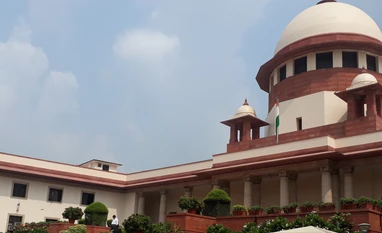Leave the issue of same-sex marriage to the Parliament: Centre tells SC
"The real question is who would take a call on what constitutes marriage between a particular class of people," Solicitor General Tushar Mehta, appearing for the Centre, said on fifth day of hearing
)
Listen to This Article
The Centre on Wednesday told the Supreme Court (SC) to consider leaving the issues raised in the pleas seeking legal recognition for same-sex marriages to Parliament.
The Constitution Bench of Chief Justice of India (CJI) D Y Chandrachud, Justices Sanjay Kishan Kaul, Ravindra Bhat, Hima Kohli, and P S Narasimha continued with the hearing of submissions on behalf of the petitioners and the Centre in a batch of petitions about ‘marriage equality rights for LGBTQIA+ (lesbian, gay, bisexual, transgender, queer, questioning, intersex, asexual) community’.
“The real question is who will take a call on what constitutes marriage between a particular class of people,” Solicitor General Tushar Mehta, appearing for the Centre, said on the fifth day of hearing.
He added that there are several ramifications, not only on society but also on other statutes, which will need debate in society, in state legislatures, and in civil society groups.
Mehta also cited the Supreme Court of the United States case, Dobbs versus Jackson Women’s Health Organization of 2022, in which it was held that the Constitution does not confer the right to abortion. The US top court had overruled both Roe versus Wade (1973) and Planned Parenthood versus Casey (1992) which had recognised a woman’s right to make reproductive choices.
Also Read
However, the CJI told Mehta that he cannot rely on the 2022 case and said, “In India, we have gone far beyond that.”
He also argued that the court’s opinion cannot substitute legislative intent (which is otherwise manifest) by reading up or down the statute as it would have an effect on heterosexual couples because the Special Marriage Act (SMA) is largely for interfaith heterosexual couples.
“This court cannot use a different lens for heterosexual couples and another for non-heterosexual couples in the same enactment,” he said.
Petitioner’s arguments
When the matter was called out in the morning, advocate Karuna Nundy submitted her prayer to declare the right to marry under secular laws such as SMA, Foreign Marriage Act, and provisions for Overseas Citizenship of India cardholders only under Citizenship Act.
She referred to a certificate of identity issued to transgenders and cited delegated legislation under which the marriage of transgenders undergoing gender reassignment surgery has already been recognised. She argued that these forms suggest that the state already recognised transgender marriages when these marriages are pre-existing.
Nundy presented a suggestion on the workability of SMA by adding the term ‘third gender person’ which was also used in the national legal services authority judgment.
Thereafter, advocate Arundhati Katju submitted that while many issues flowing from marriage have come up for consideration before the court, however, all cannot be decided by this court. She prayed for a positive declaration that a marriage between any two persons may be solemnised under SMA and parties to such marriage will be entitled to all consequential rights and obligations, notwithstanding gender identity and sexual orientation.
She also prayed for a negative declaration binding the state not to deny rights and obligations to married couples whose marriage has been solemnised under SMA. On the question of having children, she said, “As a married couple, having a child is part of the human experience and should be equally available to all persons. A same-sex couple ought to be allowed to start a family under the Juvenile Justice Act.”
Advocate Shivam Singh submitted his arguments about the innate traits of a person as discussed in the Navtej Singh Johar judgment. He submitted that sexual orientation is so innate to a person, that it is unconstitutional to impose or discriminate on that basis.
The arguments for the petitioners have been led by senior advocates Mukul Rohatgi, Saurabh Kirpal, Maneka Guruswamy, advocate Katju, and a team of advocates from Karanjawala & Co.
More From This Section
Topics : Same-sex marriages Parliament Supreme Court
Don't miss the most important news and views of the day. Get them on our Telegram channel
First Published: Apr 26 2023 | 8:06 PM IST


